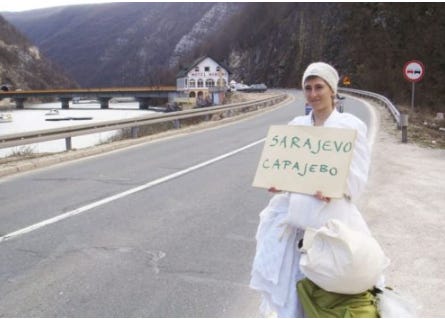Non-consenual empathy
Carolina Bianchi's A Noiva und Boa Noite Cinderela La mariée et bonne nuit Cendrillon La Trilogie Cadela Força - Kapitel I
I finally had the opportunity to witness Carolina Bianchi's "A Noiva e o Boa Noite Cinderela" ("The Bride and the Goodnight Cinderella"), a recommendation from Avgi Saketopoulou. The experience left me with a visceral taste of empathy, mingled with the unsettling exploration of sadomasochism, all in the context of a trauma far removed from my own sphere of understanding. It brought to mind the persistence of @avgolis98, who repeatedly attended Jeremy O. Harris' controversial play, "Slave Play" as discussed in her book, “Sexuality Beyond Consent.”
Bianchi, with her vehement rage towards Pippa Bacca's performance, against naivety, oversimplification and healing. Amid scenes of consensual non-consent, I wedged into a cramped theater seat, drowning in sweat, enduring a relentless two-and-a-half-hour onslaught without the respite of an intermission. Somewhere there, I understood, against my will, the love for Pippa Bacca. I understood the compulsion for repetition.
My unease compelled me to apologize to my neighbor, for there was no sanctuary in which to shield myself from the horrors unfolding on stage—a relentless revisiting of past atrocities, horrors made more real than reality itself. A hyperreality that bypassed my usual defense mechanisms. 3D glasses, IMAX film or any other gimmicks were not needed.
The layers of terror were amplified, supplemented by video feeds projected onto a screen. A screen of cinema typically serves as a buffer, separating us from the horrors depicted. Yet here, there was no refuge. Not for the audience, not for Bianchi, not for her dedicated ensemble of performers. Nothing could shield me from the recreated hell nor the harrowing knowledge it imparted. I observed the people leaving, understandably so, but I knew that not even leaving the theater would spare me from the brutal truth that was presented.
In today's climate, we are inundated with discussions about the imperative for change. We engage fervently in these dialogues as if mere participation will suffice. However, attending Carolina Bianchi's "A Noiva e o Boa Noite Cinderela" is no ticket to absolution and HAU1 is no church. There will be no salvation. There will be no healing. No forgiveness. No catharsis. Perhaps not even discussions. But it will be unforgettable.





